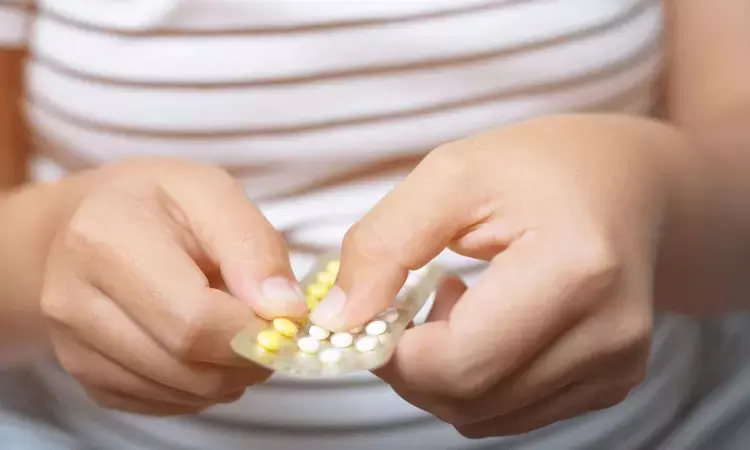- Home
- Medical news & Guidelines
- Anesthesiology
- Cardiology and CTVS
- Critical Care
- Dentistry
- Dermatology
- Diabetes and Endocrinology
- ENT
- Gastroenterology
- Medicine
- Nephrology
- Neurology
- Obstretics-Gynaecology
- Oncology
- Ophthalmology
- Orthopaedics
- Pediatrics-Neonatology
- Psychiatry
- Pulmonology
- Radiology
- Surgery
- Urology
- Laboratory Medicine
- Diet
- Nursing
- Paramedical
- Physiotherapy
- Health news
- Fact Check
- Bone Health Fact Check
- Brain Health Fact Check
- Cancer Related Fact Check
- Child Care Fact Check
- Dental and oral health fact check
- Diabetes and metabolic health fact check
- Diet and Nutrition Fact Check
- Eye and ENT Care Fact Check
- Fitness fact check
- Gut health fact check
- Heart health fact check
- Kidney health fact check
- Medical education fact check
- Men's health fact check
- Respiratory fact check
- Skin and hair care fact check
- Vaccine and Immunization fact check
- Women's health fact check
- AYUSH
- State News
- Andaman and Nicobar Islands
- Andhra Pradesh
- Arunachal Pradesh
- Assam
- Bihar
- Chandigarh
- Chattisgarh
- Dadra and Nagar Haveli
- Daman and Diu
- Delhi
- Goa
- Gujarat
- Haryana
- Himachal Pradesh
- Jammu & Kashmir
- Jharkhand
- Karnataka
- Kerala
- Ladakh
- Lakshadweep
- Madhya Pradesh
- Maharashtra
- Manipur
- Meghalaya
- Mizoram
- Nagaland
- Odisha
- Puducherry
- Punjab
- Rajasthan
- Sikkim
- Tamil Nadu
- Telangana
- Tripura
- Uttar Pradesh
- Uttrakhand
- West Bengal
- Medical Education
- Industry
Hormonal contraceptive levonorgestrel at different doses increases ectopic pregnancy risk: JAMA

A countrywide Danish research found that each of the three dosages of the hormonal contraceptive levonorgestrel-releasing intrauterine systems (13.5 mg, 19.5 mg, and 52 mg levonorgestrel IUSs) were associated with a greater risk of ectopic pregnancy when compared to other hormonal contraceptives. The findings of this study were published in the Journal of American Medical Association.
This study conducted by Amani Meaidi and team, used Danish national databases from 2001 to 2021 to track 963,964 nulliparous women without a history of ectopic pregnancy for 7.8 million person-years. The primary finding of this study was the diagnosis of ectopic pregnancy in the hospital registration upon discharge.
The major findings of this study were:
In comparison to other hormonal contraceptives, all 3 doses of levonorgestrel intrauterine systems (IUSs) had a greater absolute rate of ectopic pregnancy per 10,000 person-years: 51 mg: 7.7 (95% CI, 4.7-11.9), 52 mg: 7.7 (95% CI, 4.7-11.9), 13.5 mg: 15.7 (95% CI, 11.4-21.2), and 19.5 mg: 7.1 (95% CI, 4.3-11.2). 2.4 (95% CI, 2.1-2.6) for both hormonal contraceptives and other forms.
The 19.5 mg dosage of levonorgestrel IUS is not appreciably higher than the 52 mg dose: adjusted incidence rate ratio for ectopic pregnancy at 13.5 mg is 2.3 (95% confidence interval [CI], 1.6-3.5). 1.2 (95% CI, 0.7-1.9) is the adjusted incidence rate ratio for 19.5 mg, which is not significantly higher than the baseline rate.
In conclusion, The 19.5 mg dosage of levonorgestrel IUS is not linked to a higher risk for ectopic pregnancy when compared to the other two doses. In order to lower the chance of an ectopic pregnancy, the authors state that the 19.5 mg dose "should be preferable" above the 13.5 mg dose.
Reference:
Meaidi, A., Torp-Pedersen, C., Lidegaard, Ø., & Mørch, L. S. (2023). Ectopic Pregnancy Risk in Users of Levonorgestrel-Releasing Intrauterine Systems With 52, 19.5, and 13.5 mg of Hormone. In JAMA (Vol. 329, Issue 11, p. 935). American Medical Association (AMA). https://doi.org/10.1001/jama.2023.0380
Neuroscience Masters graduate
Jacinthlyn Sylvia, a Neuroscience Master's graduate from Chennai has worked extensively in deciphering the neurobiology of cognition and motor control in aging. She also has spread-out exposure to Neurosurgery from her Bachelor’s. She is currently involved in active Neuro-Oncology research. She is an upcoming neuroscientist with a fiery passion for writing. Her news cover at Medical Dialogues feature recent discoveries and updates from the healthcare and biomedical research fields. She can be reached at editorial@medicaldialogues.in
Dr Kamal Kant Kohli-MBBS, DTCD- a chest specialist with more than 30 years of practice and a flair for writing clinical articles, Dr Kamal Kant Kohli joined Medical Dialogues as a Chief Editor of Medical News. Besides writing articles, as an editor, he proofreads and verifies all the medical content published on Medical Dialogues including those coming from journals, studies,medical conferences,guidelines etc. Email: drkohli@medicaldialogues.in. Contact no. 011-43720751


